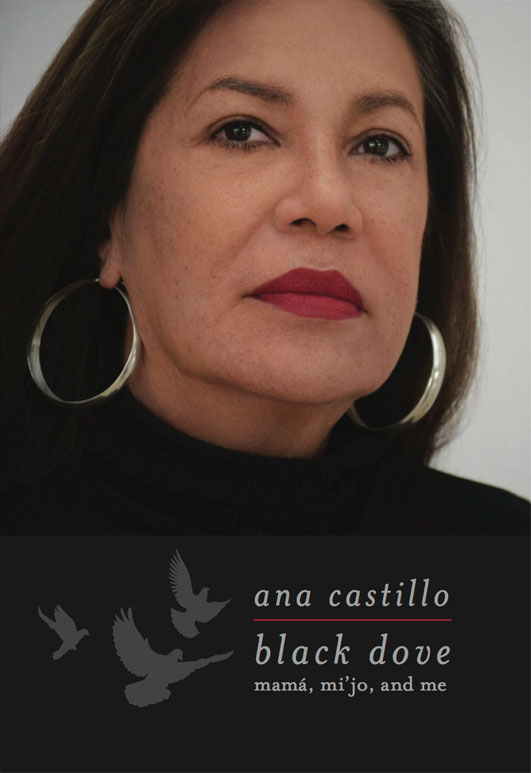Black Dove (Personal Essays / memoir, 2016)
 Recipient of International Latino Book Award in autobiography, LAMBDA award in best bisexual non-fiction.
Recipient of International Latino Book Award in autobiography, LAMBDA award in best bisexual non-fiction.
Paloma Negra,” Ana Castillo’s mother sings the day her daughter leaves home, “I don’t know if I should curse you or pray for you.”
Growing up as the intellectually spirited daughter of a Mexican Indian immigrant family during the 1970s, Castillo defied convention as a writer and a feminist. A generation later, her mother’s crooning mariachi lyrics resonate once again. Castillo—now an established Chicana novelist, playwright, and scholar—witnesses her own son’s spiraling adulthood and eventual incarceration. Standing in the stifling courtroom, Castillo describes a scene that could be any mother’s worst nightmare. But in a country of glaring and stacked statistics, it is a nightmare especially reserved for mothers like her: the inner-city mothers, the single mothers, the mothers of brown sons.
Black Dove: Mamá, Mi’jo, and Me looks at what it means to be a single, brown, feminist parent in a world of mass incarceration, racial profiling, and police brutality. Through startling humor and love, Castillo weaves intergenerational stories traveling from Mexico City to Chicago. And in doing so, she narrates some of America’s most heated political debates and urgent social injustices through the oft-neglected lens of motherhood and family.
Ana Castillo is one of the most powerful voices in contemporary Chicana literature. She is the author of So Far from God and Sapogonia, both New York Times Notable Books of the Year, as well as The Guardians, Peel My Love Like an Onion, and many other books of fiction, poetry, and essays. Her newest novel, Give It to Me won a 2014 Lambda Literary Award; her seminal collection, Massacre of the Dreamers: Essays on Xicanisma was re-released in a twentieth anniversary edition in November 2014; and the award-winning Watercolor Women, Opaque Men will be reissued in the fall of 2016
“Castillo describes a childhood and young adulthood spent moving among Mexico, Chicago, and elsewhere, pursuing education, love, and a growing sense that writing could provide a way to make sense of her life and the difficulties faced by a nation with many cultures living side by side. It is a high-wire act, to bring together a combination of personality characteristics and specific cultural touchstones and make it resonate with a wider readership, but the author handles it well… a compassionate look at those crossing points in our shared lives.”
—Kirkus Reviews
